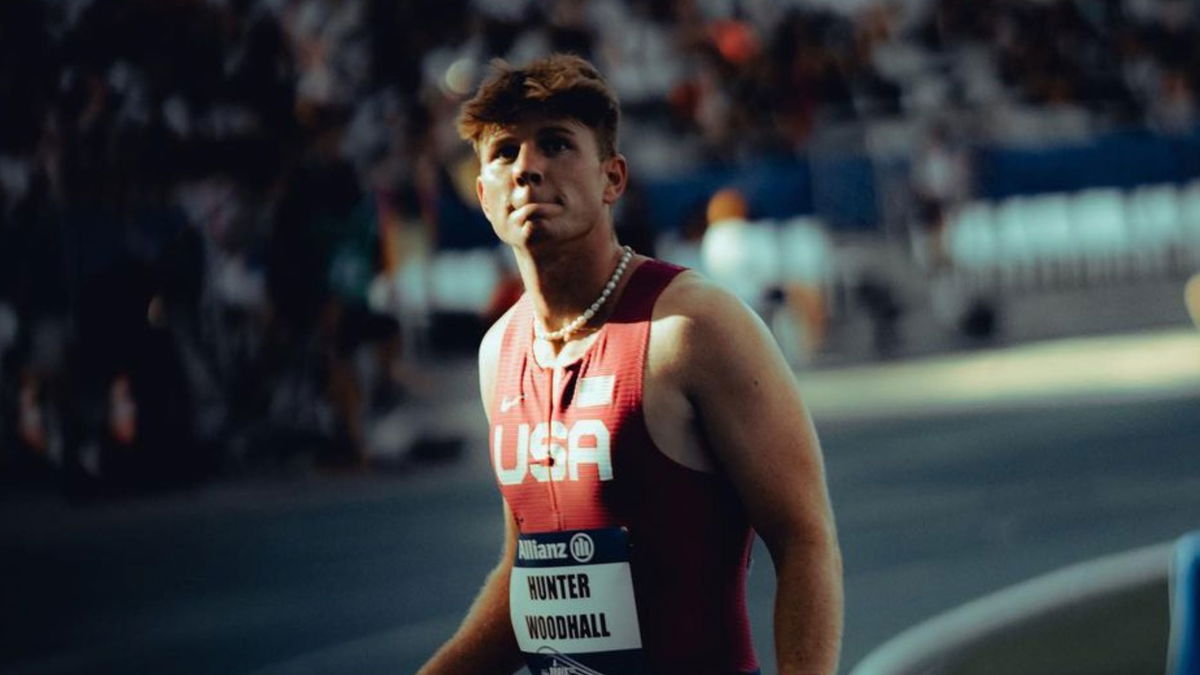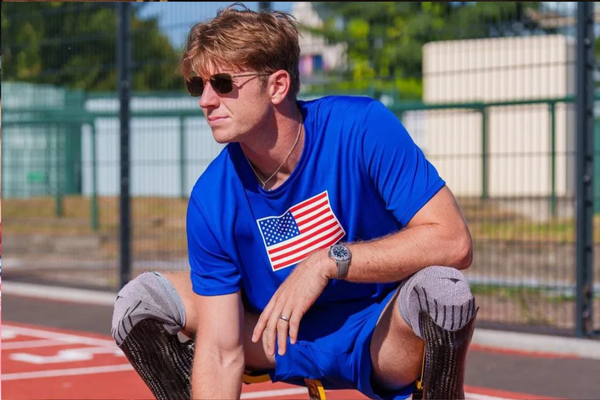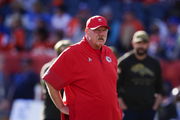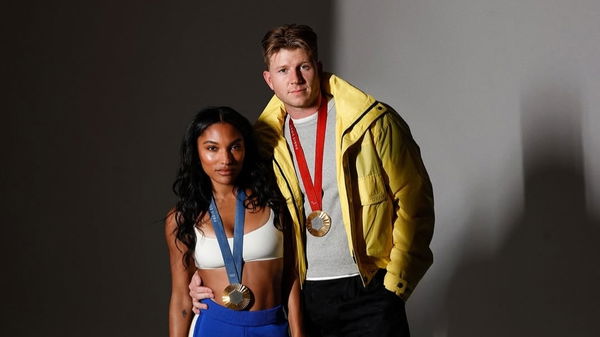

It’s been a rollercoaster season for the Woodhall family. As Tara Davis-Woodhall continues to soar with record-breaking leaps, Hunter Woodhall has faced his own set of challenges. While his season opener didn’t go as planned, Hunter’s resilience remains unshaken. At the 2025 Drake Relays, an event that marked a historic moment as he and Tara competed side-by-side for the first time. Hunter stepped back into the spotlight not only as a competitor but as a symbol of something much greater.
Watch What’s Trending Now!
“Any chance I get to compete in an able-bodied setting and show that even as a disabled athlete, I’m able to compete at that level, boosts the integrity of the Paralympic sport,” Hunter said. Coming off his gold-medal win in the 400m T62 at the Paris 2024 Paralympics, Hunter found himself lined up against Olympic-caliber athletes like Jamaica’s Sean Bailey and Zandrian Barnes. While he didn’t finish first, his very presence was a powerful statement.
And now, he’s taking that momentum and turning it into something transformative. A movement to make running more accessible to everyone. Hunter Woodhall took to Threads with an announcement that sparked both celebration and reflection. In a heartfelt post, he shared, “We’re working on a prosthetic office to make running/sports prosthetics for everyone! Got a bill passed in Arkansas that forces insurance to cover secondary prosthetics, and many other states are following! Going to make running accessible for everyone! Running is a privilege, not a right!”
ADVERTISEMENT
His message wasn’t just an update. It was a call to action. By advocating for equitable access to sports prosthetics, Hunter is not only breaking barriers on the track but also redefining how disability and athleticism can coexist on a level playing field. To fully appreciate the weight of his mission, you have to understand where it all began. The first six months of Hunter’s life were a whirlwind of uncertainty, as doctors struggled to find a solution for his condition.

ADVERTISEMENT
It wasn’t until his family connected with Shriners Hospital for Children that the life-changing decision for amputation was made. From that point on, Hunter faced life with prosthetic legs. And an unshakable will. “I mean, I had to put on my legs every morning,” he once reflected, capturing just how different his childhood looked from the norm.
ADVERTISEMENT
Constantly on the move due to his father’s Air Force career and homeschooled until fifth grade, Hunter didn’t just have to learn to walk. He had to learn how to adapt again and again. But it’s precisely that resilience that propelled him to become one of the most recognized names in Paralympic sport.
From standing on podiums to standing up for policy change, Hunter has used his platform to champion accessibility and inclusion. His story is one of grit, grace, and groundbreaking advocacy. And now, with this latest initiative, he’s proving once again that his legacy isn’t just about winning medals. It’s about opening doors. Woodhall is not only inspiring the next generation, but he’s also building the path they’ll run on.
Top Stories
Scottie Scheffler Faces Scrutiny After Taking Out Anger on Golf Club at WM Phoenix Open: ‘Washed’

Jordan Spieth Throws Bizarre Temper Tantrum as Opening Round at WM Phoenix Open Becomes a Challenge

Rob Gronkowski Demands Severe Punishment for Andy Reid After Bill Belichick Snub

PGA Tour Split Into Two as Scottie Scheffler Confirms Stance on Patrick Reed’s Return

Drake Maye Reveals Shoulder Injury Update as Patriots QB Announces News On Super Bowl Availability

Rickie Fowler Fans Demand Answers Following ESPN’s Controversial WM Phoenix Open Decision

ADVERTISEMENT
Hunter Woodhall’s honest comeback and relay redemption
Hunter Woodhall made his return to the track at a World Athletics Continental Tour meet, but the comeback didn’t go as planned. Clocking 48.13 seconds, nearly three seconds behind Jamaican star Zandrian Barnes, the result was a tough pill to swallow. But instead of hiding the disappointment, Woodhall leaned into it with courage. “I was pretty disappointed after running a bad season opener,” he admitted in an Instagram post, offering a rare moment of vulnerability.

ADVERTISEMENT
The post, which included footage of his race, wasn’t about excuses. It was about owning the moment. “Bad races happen; it doesn’t define you,” he added, grounding his message in grace and resilience. And just like that, the disappointment turned into determination. In his very next appearance, Woodhall entered uncharted territory. By running the opening leg of the 4x400m relay, a first in his career.
He delivered a stunning 46.5-second split, reminding everyone of the Paralympic champion within. “I’m back where I want to be,” he declared. “Gotta keep the pedal down!” It wasn’t just a bounce-back performance. It was a statement. One that confirmed Hunter Woodhall doesn’t let setbacks stall his momentum; he uses them to accelerate.
ADVERTISEMENT
Even in the aftermath of his Drake Relays result, Woodhall remained composed and forward-focused. In a post-race chat with Drake Athletics, he explained that he had only just shifted into speed training and that this was the latest he’d ever started a season. His words were a glimpse into a long-term strategy aimed at peaking for the World Championships.
On the same day, his wife, Tara Davis-Woodhall, soared to first place in the women’s long jump with a 6.75m leap. As a duo, they’ve turned their platform, including over 300,000 TikTok followers, into a mission: elevate the sport, advocate for Paralympic visibility, and remind the world that greatness doesn’t always follow a straight line.
ADVERTISEMENT
ADVERTISEMENT
ADVERTISEMENT